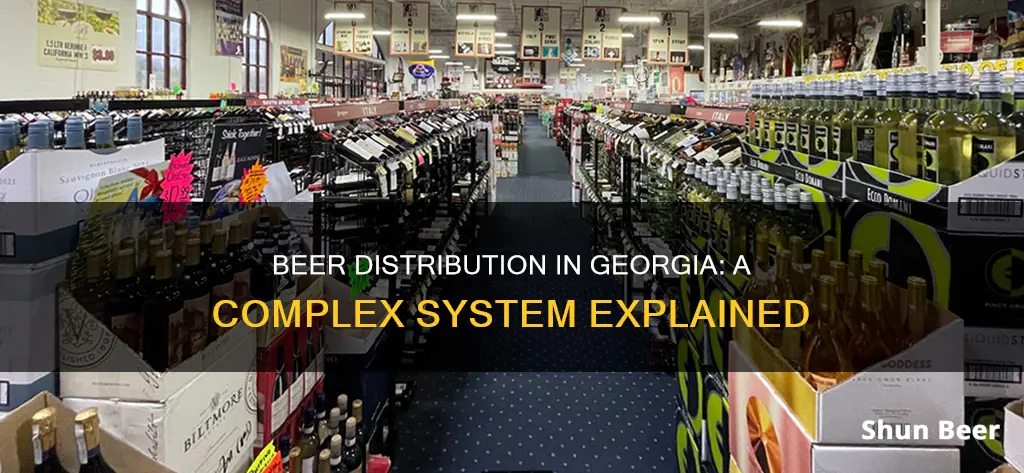
The distribution of beer in Georgia is governed by a three-tier system, which requires beer producers to sell their products to wholesalers or importers, who then market and sell them to retailers, who finally sell them to consumers. This system, which is also in place for wine and spirits in the state, is a legacy of Prohibition, and is designed to control how alcohol is sold. It is supported by legislators, who have received over $1.1 million in campaign contributions from beer wholesalers over the last 21 years, and by wholesalers, who say it ensures a wide variety of products are available to consumers. However, the system has been criticised as anti-free market, and craft brewers have been pushing for change, as they are currently considered the ''little guys' operating in a legal system that assumes they are the 'big guys'.
| Characteristics | Values |
|---|---|
| Type of distribution system | Three-tier system |
| First tier | Brewers |
| Second tier | Wholesalers/distributors |
| Third tier | Retailers |
| Regulatory requirements | Alcohol suppliers must designate an exclusive wholesaler for each brand in each territory |
| Contracts | Distribution agreements between suppliers and wholesalers |
| Form | ATT-104 form filed with the Georgia Department of Revenue |
| Self-distribution | Illegal |
What You'll Learn

The three-tier system
- Importers or producers: This tier includes brewers, winemakers, distillers, and importers. They are responsible for brewing, fermenting, and packaging the beer.
- Distributors or wholesalers: These companies can range from small, local operations to large, multi-state enterprises. They purchase beer from the producers and distribute it to the retailers.
- Retailers: This tier includes a wide range of businesses, such as liquor stores, supermarkets, bars, restaurants, and hotels. They are the ones who sell the beer directly to the consumers.
In Georgia, this system is implemented such that a supplier may sell only to a distributor, a distributor to a retailer, and a retailer to a consumer. This means that breweries cannot sell their beer directly to retailers or consumers but must go through a distributor. Georgia is also a "franchise state," which means alcohol suppliers are required to designate an exclusive wholesaler for each brand in each territory where the brand is sold.
The Magic Behind Beer Engines: How Do They Work?
You may want to see also

Franchise state
Georgia is what is often referred to as a "franchise state", which means that alcohol suppliers are required to designate an exclusive wholesaler for each brand for each territory in which that brand is sold. This is known as the regulatory designation.
In Georgia, brewers must give their distributors exclusive territories. While verbal agreements with wholesalers are permitted, brewers are also required to file the territories granted to each wholesaler with the state. If a brewer wants to modify the brands or territory of a distribution agreement, they must submit a notice of intent for the proposed change to the state for approval, and send a copy to the affected wholesalers. The notice must include the name of the current wholesaler and, if applicable, the new wholesaler, their case volume for the current and past two years, a list of anyone with a financial interest in the new wholesaler, and their reasons for requesting the change. Reasons could include the financial instability of the current wholesaler, repeated violations of the distribution agreement, and the wholesaler’s failure to maintain sales volume.
After submitting the notice of intent, the affected wholesalers can file objections to the proposed change. If objections are filed, the state will hold a hearing to investigate the matter and determine whether the brewer has valid reasons to make the change. If no objections are filed, the state will approve the change 30 days after receiving the notice of intent. During that time, the brewer must continue to supply the wholesaler until the change is approved.
Brewers are also prohibited from having any financial interest in, or ownership of, a licensed Georgia wholesaler or retailer. In addition, brewers are not allowed to force wholesalers to accept beer they haven’t ordered, restrict a wholesaler’s ability to sell other brands of beer, set resale prices for their wholesalers, or require or prohibit a management change of their wholesalers.
Beer and Blood Work: What's the Connection?
You may want to see also

Regulatory designation
Georgia is a franchise state, meaning there is a statutory and regulatory requirement for alcohol suppliers to designate an exclusive wholesaler for each brand for each territory where the brand is sold. This is known as the regulatory designation.
The regulatory designation requires a supplier to choose a distributor for each of its brands for each territory. For example, if a brewery wants to distribute in the Metro-Atlanta area, which includes Fulton County, DeKalb County, Cobb County, and Gwinnett County, they must select a distributor for each brand in each of these counties. While it is not a legal requirement, typically a brewery will choose one distributor for all brands across all territories in the Metro-Atlanta area.
Once a supplier designates a distributor with the Georgia Department of Revenue, it is challenging to switch to another wholesaler. The supplier must have a valid reason and cause to terminate the relationship. If the distributor does not voluntarily release the brands, the supplier must file a Notice of Intention to Change Wholesaler and present their case before the Administrative Hearing Office of the Georgia Department of Revenue.
The regulatory designation is a critical aspect of the three-tier system in Georgia, where suppliers and manufacturers must sell their products to a middle tier, consisting of wholesalers and/or importers. The wholesalers then market and sell the products to retailers, who, in turn, sell to consumers. This system ensures that alcohol is sold in a safe and regulated manner in the state.
Beer Hair Wash: Does it Work?
You may want to see also

Distribution agreements
The distribution of beer in Georgia is governed by a three-tier system, where beer producers (tier one) sell to wholesalers/distributors (tier two), who then sell to retailers (tier three) who sell to the consumer. This system is in place for all alcoholic beverages in the state.
Georgia is also a "franchise state", which means that alcohol suppliers are required to designate an exclusive wholesaler for each brand for each territory in which the brand is sold. This is known as the "regulatory designation".
In addition to the regulatory designation, suppliers and wholesalers may enter into distribution agreements, which are contracts that cover the terms of the distribution relationship. This agreement is important as it is very difficult for a supplier to switch wholesalers once they have designated one.
The distribution agreement may cover many areas not covered by the regulatory designation, such as price, sales goals, trademark license, and new products. However, it is important to note that the distribution agreement does not override the regulatory designation. For example, if a distributor fails to meet sales goals and the supplier terminates the agreement, the supplier would still need to file a Notice of Intention to Change Wholesaler and demonstrate cause to terminate under the revenue rules.
There are ways to align the terms of the distribution agreement with the reasons for termination provided in the revenue rules, which can give the supplier more flexibility if they wish to end the relationship with the distributor.
Thermal Beer Mugs: How Do They Keep Drinks Cold?
You may want to see also

Alcohol & Tobacco Division of the Georgia Department of Revenue
The Alcohol and Tobacco Division of the Georgia Department of Revenue plays a crucial role in regulating and overseeing the distribution and sale of beer and other alcoholic beverages in the state of Georgia. This division is responsible for ensuring compliance with state laws and regulations, facilitating the smooth operation of the alcohol industry, and generating significant revenue for the state. Here's an overview of the role and functions of this division in the context of beer distribution in Georgia:
The Alcohol and Tobacco Division is tasked with enforcing the laws and regulations pertaining to the distribution and sale of alcohol in Georgia. This includes ensuring that all entities involved in the beer distribution chain, from manufacturers to retailers, comply with licensing and permitting requirements. The division also enforces age restrictions, ensuring that alcohol is not sold to minors, and regulates the types of establishments that can sell beer, such as package stores, restaurants, and bars. By enforcing these regulations, the division maintains a controlled and safe environment for the distribution and consumption of alcohol.
Another key function of the Alcohol and Tobacco Division is facilitating the movement of beer through the three-tier system, which is a framework unique to the United States' alcohol distribution. This system separates the roles of brewers, distributors, and retailers, ensuring that each entity operates independently. The division ensures that beer distributors in Georgia operate as the middle tier, acting as the link between brewers/importers and retailers. Distributors purchase beer from manufacturers and then sell, deliver, and market the products to retailers, ensuring a consistent supply for consumers.
The division also oversees the permitting process for beer distribution. Distributors must obtain the necessary permits and licenses to operate, and the division ensures that these are issued correctly and in compliance with state regulations. This includes ensuring that distributors meet the requirements for storage, transportation, and delivery of beer, maintaining quality and safety standards. The division also handles the collection of taxes and fees associated with beer distribution, generating significant revenue for the state. These taxes include excise taxes, sales taxes, and various fees, which are levied at different stages of the distribution process.
Finally, the Alcohol and Tobacco Division provides resources and support to businesses and individuals involved in the beer distribution industry. This includes offering guidance and educational materials on compliance with regulations, as well as providing forms and instructions for licensing and permitting. The division also investigates complaints and violations, taking appropriate enforcement actions when necessary. By providing clear guidance and support, the division helps maintain a fair and competitive market for beer distribution in Georgia.
The Magic of Beer Thieves: How Do They Work?
You may want to see also
Frequently asked questions
The three-tier system is a regulatory structure that ensures that beer producers can only sell beer to wholesalers, who then deliver it to retailers, who finally sell it to customers.
Tier one is the brewers, tier two is the wholesalers, and tier three is the retailers.
Georgia is a "franchise state", which means that alcohol suppliers are required to designate an exclusive wholesaler for each brand for each territory in which that brand is sold. This is known as the regulatory designation.
No, self-distribution is illegal in Georgia. Breweries can only sell alcoholic products manufactured on-site to customers, and these sales must go through a wholesaler.







